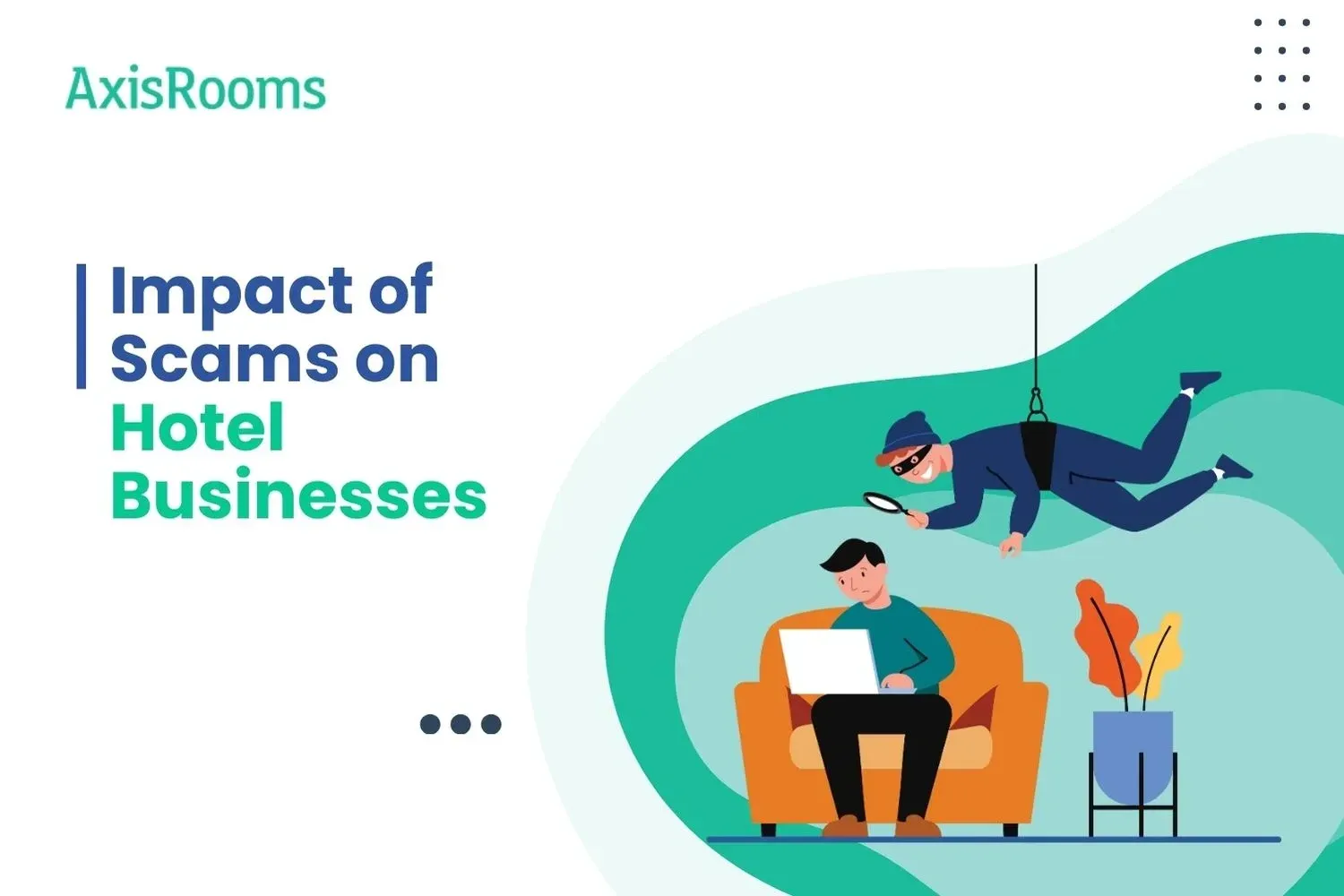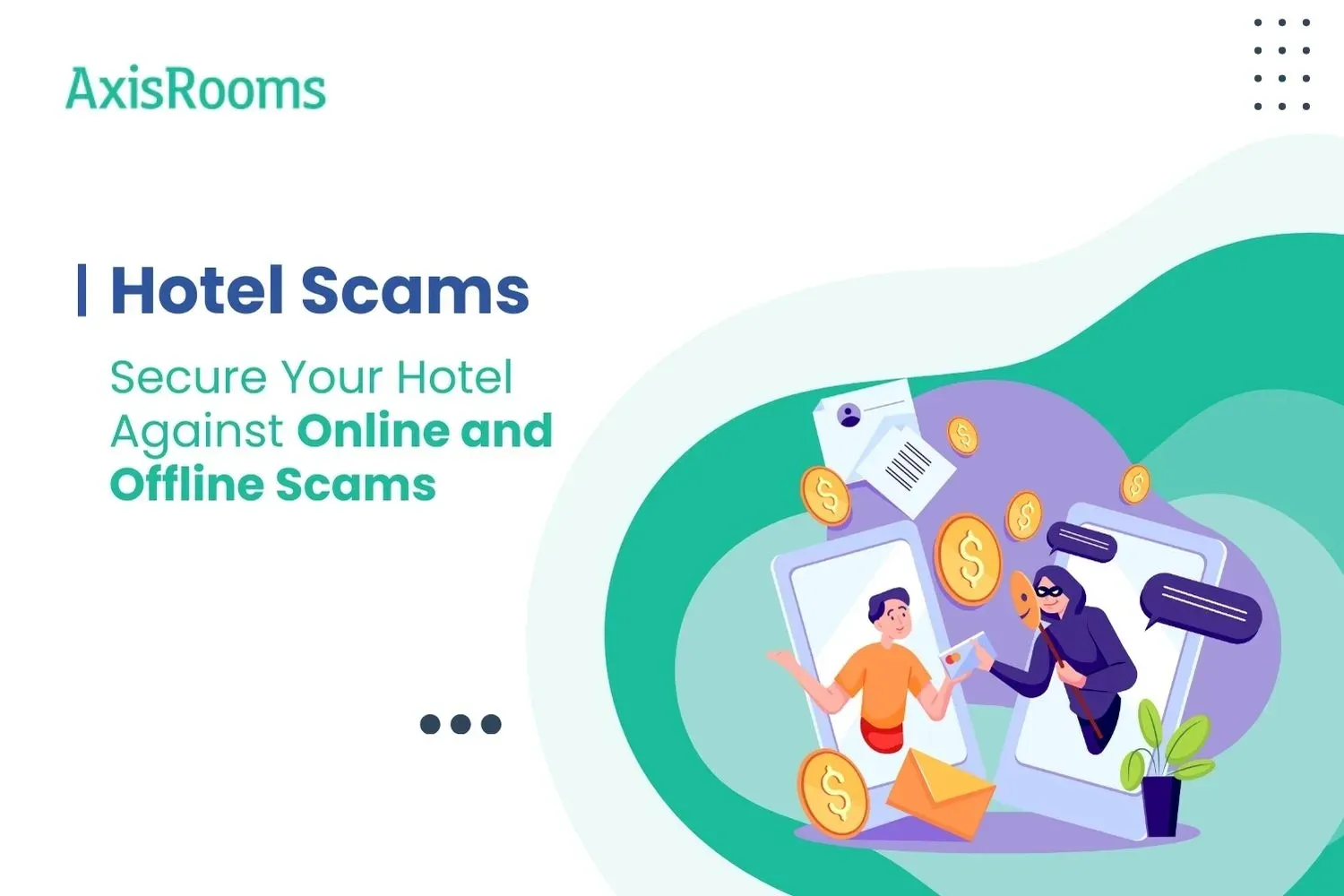Running a hotel is no easy feat. From managing bookings and delivering exceptional guest experiences to maintaining a solid reputation, the hospitality industry is full of challenges. Scammers have even made it more complicated by targeting hotels with sophisticated fraud schemes that impact revenue, operations, and trust.
Scams in the form of false booking websites, phishing emails, and overbooking fraud are emerging, and hotels are suffering from financial as well as reputational losses. But here's the good news: with proper knowledge and proactive strategies, you can protect your hotel from such threats.
This blog will cover the most prevalent scams targeting hotels, explore the potential impact of these scams, and provide actionable solutions to keep your property secure and happy guests.
Most Common Hotel Frauds Against Enterprises
False Accommodation Websites
Fake accommodation websites are created to be indistinguishable from original hotel sites and therefore deceive vulnerable guests into sending money directly to the fraudster. Guests have often arrived at the hotel in time to realize that their reservation never existed; thus, every party involved feels frustrated.
Example: A guest reserves an expensive luxury room on a seemingly legitimate-looking hotel website believed by them to belong to yours, which does offer professional appeal on your end of the company in the name through your branded photograph. What follows is the redirection in payments for transactions made; during the presentation, the guest brings complaints about the delay.
Impact:
Revenue Loss: When a scammer alters the payment destination to a dud account, your hotel loses thousands of dollars. Every wrong transaction incurred contributes to your losses and affects total profitability.
Damage to Reputation: Guests who use fake bookings to enter your hotel vent their frustrations online and write negative reviews. Such incidents scare away future guests and damage your brand image.
Supportive Statistic:
- "An estimated 15% of travelers have been victims of fake booking scams, costing the hospitality industry millions annually." (American Hotel and Lodging Association)
Solution:
- Monitor the internet for fake websites frequently, using the search tools of Google Alerts. This way, the fraudulent activity will be found early, and it can send alerts about the mentions of the name of your hotel and its keywords.
- Make sure your official website is HTTPS-enabled and visible as secure, thus providing guests with the assurance of authenticity through security badges or verified certificates.
- Offer guests incentives to book directly with your official website, such as discounts or free services, and feature it in your marketing communications, including social media and email campaigns.
Phishing Attacks
Phishing scams target hotel staff through emails or messages that appear legitimate but are designed to steal sensitive information, such as login credentials or financial data.
Example Scenario: An email claiming to be from your payment processor requests your staff to confirm account details. The email includes a malicious link that, once clicked, grants scammers access to your systems.
Impact:
- Data Breaches: Loss of guest data, including credit card information.
- Regulatory Fines: Possible fines under GDPR or similar legislation.
Supporting Statistic:
- "Over 90% of data breaches originate from phishing emails, making them the most common vector for cybercrime." (Verizon’s Data Breach Investigations Report)
Solution:
- Train your employees well on recognizing phishing emails, specifically how to detect a suspicious sender address, an unexpected link, or unusual content in an email. Encourage them to check the authenticity of every request before responding.
- Make use of advanced email filters and spam detectors to prevent phishing attacks proactively, thereby reducing risks.
- Enforce two-factor authentication (2FA) for all logins on your system, adding another layer of security against unauthorized access.
Overbooking Scams
Fraudsters book several using stolen credit card details and cancel at the last minute or don't show up. This not only disrupts operations but also creates revenue loss.
Impact:
Revenue Loss: It results in unoccupied rooms during peak demand.
Operational Challenges: Overwhelming the reservation team's workload.
Solution:
- Implement payment verification tools to verify the genuineness of transactions by verifying guest payment details before confirming bookings, thus reducing the occurrence of fraudulent transactions, and ensuring all payments are genuine.
- Monitor booking patterns for suspicious activities such as multiple bookings from the same IP address or group bookings of unusual size, and flag such activities for further reviewing.
- Implement real-time inventory management systems that synchronize room availability across all platforms, minimizing the risks of overbooking and vulnerabilities to manipulation.
Exploitation of Unsecured Wi-Fi
Unsecured Wi-Fi networks are an open door for cybercriminals to intercept sensitive guest data, including credit card details, email logins, and personal information.
Impact:
Data Breaches: Compromised guest trust.
Lawsuits: Potential legal action from affected guests.
Supporting Statistic:
- "Hotels are one of the top five industries targeted by cyberattacks, particularly due to unsecured Wi-Fi networks." (Symantec’s Internet Security Threat Report)
Solution:
- Offer guests a secure, password-protected Wi-Fi network. Ensure that your Wi-Fi network is well protected with advanced security measures for sensitive guest data.
- Use firewalls and advanced encryption protocols to protect the network from unauthorized access and cyberattacks.
- Regularly update your network's software and firmware to patch vulnerabilities and strengthen defenses against new security threats.
Impact of Scams on Hotel Businesses

Financial Consequences
Scams do have a direct and significant bottom-line impact on a hotel's bottom line. The lost revenue would be the primary result of fraudulent bookings, for example, as rooms are either held for no-shows or refunds are made for illegitimate claims. Further, operational costs increase as the staff spends much more time to resolve issues and respond to complaints.
Supporting Statistic:
- "A single data breach costs the hospitality industry an average of $4.18 million, including fines, lost revenue, and recovery expenses." (IBM Cost of a Data Breach Report)
Reputational Damage
A hotel’s reputation is built on guest trust and satisfaction, and scams can severely damage both. Negative reviews from guests who were scammed—whether they fell victim to fake booking websites or phishing attacks—can erode trust in your brand. Potential guests may question your ability to provide secure, seamless experiences.
Regulatory Penalties
With strict regulations such as GDPR, hotels can't take the issue of data protection lightly. The breach from a scam such as phishing or open Wi-Fi might result in enormous fines and litigation, thus making the financial damage and reputation crisis even worse.
Supporting Statistic:
- "GDPR non-compliance can result in fines of up to €20 million or 4% of annual global turnover." (European Commission)
Ways to Secure Your Hotel
Hotel Security Best Practices
To be a step ahead of scammers, your hotel should establish a solid list of security measures:
- Train staff on fraud awareness: Teach employees to look for warning signs like a convoluted booking request, an unsolicited email that requests personal data, or odd payment patterns. This helps to ensure your staff is informed on the most up-to-date techniques fraudsters are using and what to do when faced with one.
- Implement Strong Cybersecurity Protocols: Secure your hotel systems with high-end cybersecurity tools such as firewalls, antivirus software, and encrypted communication channels. Enforce policies for the use of strong, unique passwords and implement multi-factor authentication for all logins.
- Monitor your online presence. Use Google Alerts to alert you on mentions of your hotel name, and use third-party checks on sites for fraudulent listings. It's best to act swiftly against fake websites or suspicious activity as this can help guard the hotel's brand against scams and affect your guests.
- Secure Financial Transactions: All financial transactions should be processed through trusted, secure gateways. Regular audits of your payment systems and records can help identify potential vulnerabilities before scammers exploit them.
Front Desk Security
Your front desk is the first line of defense against scammers. By strengthening your procedures here, you can significantly reduce risks:
- Verify Guest Identities: Always request photo identification and match it with the reservation details before check-in. For corporate bookings, confirm the company name and authorized person to prevent impersonation fraud.
- Secure Booking Confirmation Process: Use automated booking systems that provide verified confirmation numbers directly to guests via email or SMS. Ensure that manual bookings are backed by legitimate payment methods before assigning rooms.
- Minimize Manual Handling: Implement digital check-in systems, which will reduce the chances of error and ensure all guest data is safely stored. Automated check-in processes prevent unauthorized access and allow for smooth processes for staff as well as guests.
Fraud Detection Tools
Advanced fraud detection tools can protect your hotel from any kind of fraud by detecting such activities at the earliest. These tools can assist in the following ways:
- Real-Time Booking Verification: Fraud detection software scans bookings for anomalies, such as multiple reservations from the same credit card or repeated attempts from a single IP address. These anomalies can be flagged, and thus your hotel will verify authenticity before confirming reservations.
- Payment Security Features: Select payment gateways with built-in fraud protection that authenticate transactions through multiple layers, including address verification systems (AVS) and card security codes (CVV).
- Pattern Recognition: Fraud detection tools apply machine learning to analyze the booking behavior, establishing trends suggesting fraud. This helps you refine your policies and reject fraudulent activities before they occur.
Incident Reporting Procedures
Reporting suspicious activity in a structured process ensures that swift and effective responses are generated to potential scams:
- Standardize Reporting Protocols: Create a clear, step-by-step guide for staff to follow when identifying and reporting incidents. Include examples of common scams and what information to gather, such as emails, phone logs, or screenshots.
- Centralized Reporting System: Have a centralized platform for logging all suspicious activities. This will help management identify patterns and ensure that the same kinds of incidents are handled similarly by all departments.
- Review and Update Procedures: Review your reporting protocols regularly to incorporate new threats and reduce response times. Engage staff feedback to ensure the process is effective and easy to follow.
Using Technology for Protection
Role of PMS in Combating Fraud
Contemporary Property Management Systems (PMS) are vital tools for fraud prevention, providing features that enhance operational security:
- Centralized Data Management: A PMS system consolidates all bookings, payments, and guest interactions into one secure system. This reduces the possibility of fraudulent bookings happening. All bookings and incidents can be traced in real time.
- Real-Time Alert: A number of PMS systems have inherent fraud detection tools that flag suspicious activities. For instance, a sudden increase in several bookings using the same mode of payment might raise an alert for investigation by the hotel staff.
- Integrated Security Tools: PMS systems can be integrated with third-party fraud detection and payment verification tools, giving an all-inclusive shield from scams. Thus, it is error-free compared to manual error-prone entries and ensures constant security across every booking channel.
AxisRooms Channel Manager: Providing Security
- Overbooking Protection: Channel Manager synchronizes the room availability on all channels in real-time. This helps to avoid overbookings and lessens the possibility of a scammer taking advantage of your inventory during peak seasons.
- Rate Parity Assurance: The scammers target rate discrepancies between OTAs and direct booking channels. With AxisRooms, you can be sure that there will be a rate parity on all channels. Guest trust will increase, and confusion will decrease.
- Real-Time Updates: AxisRooms automatically updates your inventory and rates, avoiding manual errors and ensuring that your systems reflect accurate, real-time information. This proactive approach reduces vulnerabilities and improves operational efficiency.
- Enhanced Fraud Detection: AxisRooms offers robust data analytics that helps identify suspicious patterns, such as sudden spikes in cancellations or unusual booking behaviors. These insights allow you to take corrective action quickly, minimizing potential losses.
Conclusion
Scams are an unfortunate reality in today’s digital age, but staying vigilant and proactive can protect your hotel from becoming a victim. By educating your staff, implementing advanced tools, and integrating solutions like AxisRooms Channel Manager, you can safeguard your operations, maintain guest trust, and ensure smooth, scam-free experiences.
Secure Your Hotel's Future Today with AxisRooms. Try out our demos to see how our solutions help keep your property safe and profitable!


